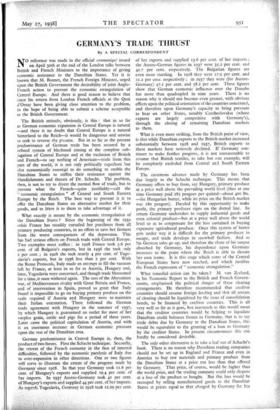GERMANY'S TRADE THRUST
By A SPECIAL CORRESPONDENT
NO reference was made in the official communiqué issued on April 3oth at the end of the London talks between British and French Ministers to the importance of giving economic assistance to the Danubian States. Yet it is known that M. Bonnet, the French Foreign Minister, urged upon the British Government the desirability of joint Anglo- French action to prevent the economic strangulation of Central Europe. And there is good reason to believe that since his return from London French officials at the Quai d'Orsay have been giving close attention to the problem, in the hope of being able to submit a scheme acceptable to the British Government.
The British attitude, obviously, is this : that in so far as German economic expansion in Central Europe is natural —and there is no doubt that Central Europe is a natural hinterland to the Reich—it would be dangerous and unwise to seek to reverse the process. But in so far as the present predominance of German trade has been secured by a refined system of blackmail aiming at the complete sub- jugation of Central Europe and at the exclusion of British and French—to say nothing of American—trade from this part of the world, it is not only politically expedient but also economically essential to do something to enable the Danubian States to stiffen their resistance against the blandishments and threats of Dr. Schacht. The problem, then, is not to try to divert the normal flow of trade, but to prevent what the French—quite justifiably—call the "economic strangulation" of Central and South Eastern Europe by the Reich. The best way to prevent it is to offer the Danubian States an alternative market for their goods, and to leave it to them to take advantage of it.
What exactly is meant by the economic strangulation of the Danubian States ? Since the beginning of the 1932 crisis France has steadily curtailed her purchases from all primary producing countries, in an effort to save her farmers from the worst consequences of the depression. This has had serious effects on French trade with Central Europe. Two examples must suffice : in 1928 France took 5.6 per cent. of all Bulgaria's exports, but in 1936 she took only 2 per cent. ; in 1928 she took nearly 4 per cent. of Yugo- slavia's exports, but in 1936 less than 2 per cent. With the Rome Protocols, Italy made an attempt to fill the vacuum left by France, at least in so far as Austria, Hungary and, later, Yugoslavia were concerned, and though trade blossomed for a time, it soon withered again. The cost of the Abyssinian war, of Mediterranean rivalry with Great Britain and France, and of intervention in Spain, proved so great that Italy found it impossible to go on buying primary produce on the scale required if Austria and Hungary were to maintain their Italian orientation. There followed the German trade agreement with Hungary in the summer of 1937, by which Hungary is guaranteed an outlet for most of her surplus grain, cattle and pigs for a period of three years. Later came the political capitulation of Austria, and with it an enormous increase in German economic pressure upon the rest of the Danubian area.
German predominance in Central Europe is, then, the product of two forces. First the Schacht technique. Secondly, the retreat of the French economy in the face of internal difficulties, followed by the economic paralysis of Italy due to over-expansion in other directions. One or two figures will serve to illustrate the extent of the progress made by Germany since 1928. In that year Germany took ix.6 per cent. of Hungary's exports and supplied 19.4 per cent. of her imports. In 1937 Austro-Germany took 41 per cent. of Hungary's exports and supplied 44 per cent. of her imports. As regards Yugoslavia, Germany in 1928 took 12.09 per cent. of her exports and supplied 13.6 per cent. of her imports ; the Austro-German figures in 1937 were 35.2 per cent. and 42.7 per cent. respectively. The Bulgarian figures are even more startling. In 1928 they were 27.9 per cent. and 21.2 per cent. respectively ; in 1937 they were (for Austro- Germany) 47.1 per cent. and 58.2 per cent. These figures show that German economic influence over the Danube has more than quadrupled in nine years. There is no reason why it should not become even greater, with obvious effects upon the political orientation of the countries concerned, and therefore upon Germany's capacity to bring pressure to bear on other States, notably Czechoslovakia (whose exports are largely competitive with Germany's), through the closing of remaining Danubian markets to them.
What is even more striking, from the British point of view, is that while Danubian exports to the British market increased substantially between 1928 and 1937, British exports to these markets have seriously declined. If Germany con- tinues to make further progress, it is not unreasonable to assume that British textiles, to take but one example, will be completely excluded from Central anl South Eastern Europe.
The enormous advance made by Germany has been due largely to the Schacht technique. This means that Germany offers to buy from, say Hungary, primary produce at a price well above the prevailing world level (thus at one time Germany paid 285 pengoes per quintal—about 400 lbs. —for Hungarian butter, while its price on the British market was 18o pengoes). Dazzled by this opportunity to make profit, the primary producer signs on the dotted line. In return Germany undertakes to supply industrial goods and even colonial produce—but at a price well above the world level so as to compensate for the loss sustained in buying expensive agricultural produce. Once this system of barter ge..ts under way it is difficult for the primary producer to escape, and trade develops in snowball fashion. And as his German sales go up, and therefore the share of his output absorbed by Germany, his dependence upon Germany increases to the point where the Reich is able to dictate her own terms. It is this stage which some of the Central European States have now reached, and which justifies the French expression of" economic strangulation."
What remedial action can be taken ? M. van Zecland, in his Economic Report to the British and French Govern- ments, emphasised the political danger of these clearing arrangements. He therefore recommended that creditor countries should resume foreign lending and that all arrears of clearing should be liquidated by the issue of consolidation bonds, to be financed by creditor countries. This is all very well so far as it goes, but inasmuch as this would mean that the creditor countries would be helping to liquidate Danubian credit balances frozen in Germany, that is to say trade debts due by Germany to the Danubian States, this would be equivalent to the granting of a loan to Germany by the creditor States. In present circumstances this can hardly be considered desirable.
The only other alternative is to take a leaf out of Schacht's book. There is no reason why Danubian trading companies should not be set up in England and France and even in America to buy raw materials and primary produce from the Danubian States at a price not less than that offered by Germany. That price, of course, would be higher than the world price, and the trading company could only dispose at a loss of the product so bought. But this loss would be recouped by selling manufactured goods to the Danubian States at prices equal to that charged by Germany for ha manufactured goods sold to these States. In this way the States concerned would be offered an alternative outlet for their goods.
All this boils down to France's willingness and capacity to buy primary produce. If she cannot or will not do so, -the plan must fail. It is quite possible that Great Britain might be able to absorb some more primary produce and raw materials from the Danubian States, but only on condition that these countries resumed their purchases of British textiles and other manufactures. It is important to emphasise this side of the problem, for financial and economic assis- tance without a sure economic foundation and given solely for political reasons cannot in the long run succeed. What is wanted, then, is a reconsideration of recent British and French commercial policy in close co-operation with other States, including Italy, in need of primary produce, but unable to afford to buy them owing to sheer financial debility.



















































 Previous page
Previous page